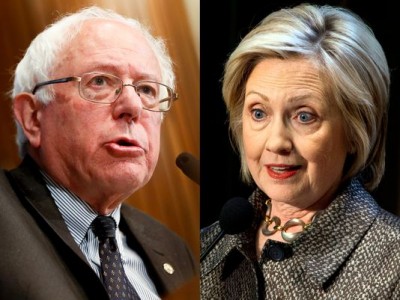Bernie Sanders and Hillary Clinton on Rwanda and ‘Humanitarian Intervention’

Hillary Clinton and Bernie Sanders sparred about U.S. foreign policy in Latin America, and particularly Honduras, during the debate in Miami, Florida.
In other debates, they have discussed the Middle East, Libya, Egypt, Russia, China and North Korea, but not Sub-Saharan Africa. Their most noted remarks about that part of the world have been about Rwanda and the so-called U.S. failure to intervene to stop the massacres of 1994. Both echo then Sen. Obama in a 2008 presidential debate with Sen. John McCain:
If we could have intervened effectively in the Holocaust, who among us would say that we had a moral obligation not to go in. If we could have stopped Rwanda, surely, if we had the ability, that would be something that we would have to strongly consider and act. So, you know, when genocide is happening, when ethnic cleansing is happening somewhere around the world and we stand idly by, that diminishes us. So I do think we have to consider it as part of our interest, our national interest. But understand that there’s a lot of cruelty around the world. We’re not going to be able to be everywhere all the time. That’s why it’s so important for us to be able to work in concert with our allies.
Hillary Clinton claims that she urged her husband to intervene in Rwanda, and he backs her up in that claim. Daily Kos writer Shane Hensinger accuses Clinton of lying and cites her White House schedule from the first week of April to mid-July 1994 as evidence. He says that during the key moments at which U.S. and U.N. policymakers discussed the crisis in Rwanda, First Lady Hillary Clinton was meeting Princess Margaret and attending a Royal Ballet gala, brunching with King Hussein and Queen Noor of Jordan, attending the DNC gala, etcetera, etcetera. Hensinger does not question the narrative about failure to intervene in Rwanda.
In 2015, Vox interviewer Ezra Klein asked Bernie Sanders whether the US should have intervened to stop the Rwandan Genocide. Sanders responded, ““Yes, but it’s not just America. This is the problem that we face. We are spending more money on the military than the next nine countries behind us. Where is the U.K.? Where is France? Germany is the economic powerhouse in Europe. They provide health care to all of their people; they provide free college education to their kids. You know what? Germany and France and the U.K. and Scandinavia and the rest of Europe, all of us have got to work together to prevent those types of genocide and atrocities, and we have to strengthen the United Nations in order to do that.”
U.S. policymakers and pundits have repeatedly invoked Rwanda and U.S. responsibility to stop genocide and mass atrocities to justify the U.S./NATO bombing in Libya and Syria. As the U.S. and NATO’s war on Libya began, Pakistani writer Tariq Ali wrote in the Monthly Review,
“The sheer cynicism is breathtaking. We’re expected to believe that the leaders with bloody hands in Iraq, Afghanistan and Pakistan are defending the people in Libya. The fact that decent liberals still fall for this rubbish is depressing.”
On the fifth anniversary of the 2003 U.S. invasion of Iraq, Ali wrote, in one of 90 statements published by the Brussels Tribunal,
“The human cost of this war would, if some other country were doing it, be labeled genocide.”
Writers including Robin Philpot, author of “Rwanda and the New Scramble for Africa,” and Ed Herman and David Peterson, authors of “Enduring Lies: Rwanda in the Propaganda System 20 Years Later,” argue that the story of the U.S. and U.N. failure to stop the mass killing in Rwanda is a lie because the U.S. and U.K. in fact supported Gen. Paul Kagame’s invasion to seize power in Rwanda, which included the massacre of hundreds of thousands of Hutu civilians.

